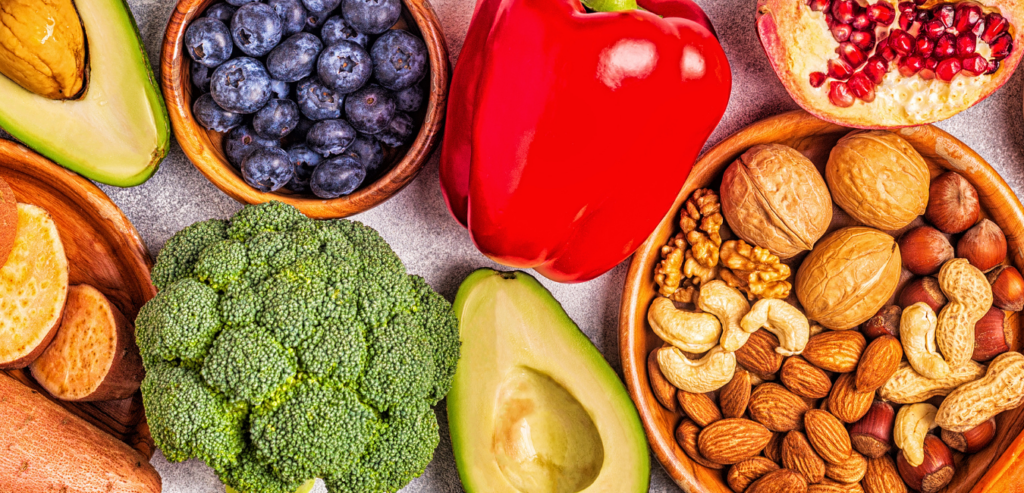10 Delicious Anti-inflammatory Foods to Eat. Evidence-Based
To understand the question of what is an anti-inflammatory diet or anti-inflammatory food, we need to understand that what inflammation is. Then we will know much better about anti-inflammatory diet and the health benefits of an anti-inflammatory diet.

Inflammation is a natural immune response. It protects the body against infections, injuries, and toxins. If inflammation persists for prolonged periods of time, it becomes chronic.
As a result, it triggers other associated diseases including Alzheimer’s disease, diabetes, depression, heart diseases, and cancer.
An anti-inflammatory diet is designed to lower the risk of chronic inflammation with healthy changes in your diet and protect the body from many life-threatening disorders.
The food that we chose to eat can tend to fight against inflammation in the body. Such foods or diet is referred to as Anti-Inflammatory diet.
An anti-inflammatory diet of fresh fruits or vegetables is a good source of many anti-oxidant compounds. Antioxidants lower the level of free radicals in the body that causes inflammation. They can lead to cell damage which increases the risk of inflammation and various chronic diseases.
Foods with omega-3 fatty acids, whole wheat, magnetic protein, healthy fats, and spices favor an anti-inflammatory diet. An antiinflammatory diet mainly contains foods that are usually plant-based such as fruits, berries, nuts, peas, beans, and legumes.
One should make sure to choose wild fish, healthy organic eggs, and grass-fed terrestrial animals to eat animal-based protein sources.
The consumption of processed foods, red meats, and alcohol is discouraged during inflammation.
Here are the top anti-inflammatory foods that you can have on a regular diet.
Berries
Berries are small fruits with low sugar content. They are high in fibers. Berries are packed with vitamins A, C, E, and minerals.
Berries contain anti-oxidant anthocyanin. These compounds have anti-inflammatory effects. So berries help in preventing inflammatory diseases. They boost the immune system and reduce the risk of heart disease.
Some most common varieties of berries are;
- Blueberries
- Raspberries
- Blackberries
In a study conducted on 25 subjects over a period of six weeks, it was found out that a daily intake of 375 grams of blueberries reduces oxidative stress and increases the anti-inflammatory cytokines (26).
In adults, berries can help in preventing inflammatory markers related to heart diseases (27).
Adding berries to your morning fruit plate proves to be healthful and joyful. You can also add berries in a green protein smoothie. Increased production of natural killers is associated with the consumption of berries.
Broccoli
Broccoli is an entirely nutritious food. It is packed with Vitamin C and Vitamin K. it also contains folate and fibers in rich amounts.
Broccoli is an anti-inflammatory powerhouse vegetable. It contains antioxidants like flavonoids, quercetin, kaempferol, and a variety of carotenoids.
Broccoli is a cruciferous vegetable, including Kale and cauliflower. Cruciferous vegetables are a good source of anti-oxidants. They have a strong anti-inflammatory effect.
Eating broccoli reduces the risk of heart-related diseases and cancer.
Broccoli is rich in Sulforaphane which is an antioxidant with potent anti-inflammatory effects. It fights inflammation by attenuating oxidative stress and preventing cell/tissue damage.
Broccoli is also rich in Vitamin K1 and K2. They have strong anti-inflammatory properties and reduce inflammation (28, 29).
Fatty Fish
Fatty fish is one of the best sources of Omega-3-fatty acids and protein. They contain long-chain omega-3-fatty acids, which help to fight inflammation. Your body converts these fatty acids into valuable compounds like protectins and resolvins, which have potential anti-inflammatory effects (2).
Wild salmon, the cold-water fatty fish, is a rich source of protein and is packed with a significant amount of vitamins and minerals. It contains vitamin B12, B13, vitamin D, potassium, and selenium. Salmon helps to fight inflammation and reduces the risk of chronic inflammation.
Fatty fish containing omega3 include:
- Herring
- Lake trout
- Mackerel
- Sardines
Eicosapentaenoic acid (EPA) and Docosahexaenoic acid (DHA) present in fatty fish helps to reduce inflammation. It prevents many metabolic syndromes, diabetes, kidney disease, and heart disorders. It also improves mental health (30).
Studies have shown that people using salmon or fatty fish as a regular diet in inflammatory bowel disease experience a decreased level of the inflammatory marker, the C-reactive protein (31).
Older women having one or two fatty fish consistently in a week reduce the risk of developing rheumatoid arthritis caused by inflammation of joint tissues (32).
Kale
Kale is one of the most nutrient-rich foods that have anti-inflammatory effects. Its dietary profile is loaded with vitamins, minerals, and antioxidants. Out of all the super healthy greens, kale is the king.
Kale contains antioxidants like quercetin and kaempferol that protect the body against free radicals. These antioxidants have strong anti-inflammatory properties that provide health protection and reduce blood pressure (33).
Kale is also an excellent source of vitamin C, flavonoids, polyphenols, and phytonutrients that helps the body against cellular damage.
Kale is nutrient-dense food containing various amino acids, fibers, vitamin A, vitamin K, iron, magnesium, and calcium that benefits the body in the form of healthy eyes, a strong digestive system, and strong bones (34).
Kale, with its strong anti-inflammatory properties, helps in maintaining and boosting the immune system (35).
Avocados
Avocados are one of the nutrient-rich superfoods with strong anti-inflammatory effects. It contains an immense range of bioactive compounds that reduce the risk of many types of inflammations in the body.
Avocados contain carotenoids which reduce the risk of cancer. It is packed with magnesium, potassium, and fibers that have many health benefits (36).
Avocados are a rich source of antioxidants and healthy mono-saturated fats. Healthy fats and antioxidants have a significant role in controlling the inflammatory response.
Avocados intake reduces the inflammation of tissues between joints. Thus, preventing arthritis.
Avocados intake reduces inflammatory blood markers. Hence it reduces inflammation and the risk of many chronic diseases (37).
Mushrooms
Mushrooms are reported to provide a wide range of compounds that can help increase immunity and decrease inflammation and swelling in the body.
Mushrooms exhibit antimicrobial, anti-inflammatory, and antiviral properties that make them the most trusted healthy inflammation-preventing food.
Mushrooms are low in calories and rich in vitamins B, selenium, and copper. They are also rich in phenols and many other antioxidant compounds (38).
Mushrooms contain polysaccharides consisting of long chains of beta-glucans that promote a robust immune system and contain a potent antioxidant, called ergothioneine, which can combat inflammation.
Mushrooms are also a significant source of protein, fibers, and different B vitamins. Different edible mushrooms with anti-inflammatory effects are truffles, Chaga mushrooms, and Portobello mushrooms (39).
Chaga mushrooms are antioxidants powerhouse with a strong tendency of fighting free radicals and inflammations (40).
A special kind of mushroom named lion’s mane is reported to potentially reduce low-grade obesity-related inflammation in the body (41).
Beans
Black beans, lentils, and other pulses of the family are high in fibers and abundant in antioxidants that lower inflammation.
Beans are also rich in vitamin K and phenols. These nutrients enhance the anti-inflammatory properties of beans.
The addition of beans to your diet minimizes the risk of chronic inflammations, heart diseases, diabetes, and high blood pressure.
According to studies, extracts of bean hulls are able to modulate inflammation in the body and can also reduce the risk of cardiovascular diseases (42, 43).
Tomatoes
Tomatoes are a rich source of nutrients and minerals. They are considered the powerhouse of nutrients. The anti-inflammatory properties of tomatoes make them one of the most healthful diets on planet earth.
Tomato contains vitamin B6, potassium, vitamin k1, and vitamin C. Vitamin C is an important component for antioxidant synthesis in the body. These are the compound that minimizes the level of free radicals in the body (44).
Tomato is rich in antioxidants, which give anti-inflammatory characters to it. Lycopene, present in tomatoes is an antioxidant with impressive anti-inflammatory properties. It is significant for reducing pro-inflammatory responses related to several types of cancers.
Studies have reported that drinking tomato juice regularly reduces the inflammatory markers in obese women (45).
Lycopene with beta carotenes reduces the risk of heart attack and strokes. They also show a protective effect on the inner layer of blood vessels. Hence, reducing the risk of blood clotting.
Tomatoes have a high abundance of lycopene. The tomato products, including ketchup, paste, and sauce, have the highest concentrations of lycopene in them (46).
Turmeric, Ginger, and Garlic - Anti-inflammatory foods
Turmeric is a powerful, flavor spice used abundantly in foods. It is also present in curry powders with a yellow-orange color.
Turmeric contains curcumin as the main ingredient which has sound anti-inflammatory effects and it has been used as a medical herb for thousands of years (47).
It is much more effective to take supplements of extracted curcumin. Curcumin supplements are also associated with piperine, which can increase the absorption of curcumin by 2000 percent.
The strong anti-inflammatory properties of curcumin are reported to be similar to many effective anti-inflammatory drugs and it fights inflammation on a molecular level.
Turmeric reduces inflammation related to diabetes, arthritis, and other inflammatory diseases (48).
Ginger is a commonly consumed spice worldwide and has been used as a traditional remedy to treat cold, headache, nausea, and vomiting for centuries.
Ginger's most bioactive ingredient, gingerol, is the source of much of its anti-inflammatory and therapeutic qualities.
The active compounds present in ginger protect the body against inflammation-related diseases including cancer, myocardial infarction, Alzheimer's disease, diabetes, arthritis, osteoporosis, and inflammatory bowel disease (49, 50).
Garlic is cultivated all over the world and has been used anciently due to its unique medicinal properties. The bioactive compounds present in garlic include organic sulfides, phenolic compounds, saponins, and polysaccharides.
The strong antioxidant capacity of garlic exhibited by the nutritional and phenolic compounds present in it significantly reduces oxidative stress and protects the body from many diseases.
The amazing anti-inflammatory properties of garlic protect the health of many organs of the body including the kidney, liver, and studies have also reported inhibition of neuroinflammation by habitual use of garlic (51, 52).
Grapes
Grapes are nutrient-rich packed with Vitamin C and Vitamin K. It contains antioxidants in high concentration which prevents many chronic inflammations.
Grapes contain anthocyanin, a powerful antioxidant compound that reduces inflammation. They may also reduce the risk of diabetes, cancer, and heart diseases.
Grapes also reduce the risk of obesity, eye disorders, and Alzheimer's.
Resveratrol, a plant antioxidant compound found in grapes, reduces inflammation and the risk of heart disorders (53).
Study shows that people with heart disease who consume grapes daily experience a decrease in inflammatory genes markers (54).



